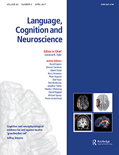
Language Cognition and Neuroscience
Scope & Guideline
Innovative Insights into Language Processing and Cognition
Introduction
Aims and Scopes
- Language Processing Mechanisms:
The journal explores the cognitive and neural processes involved in language comprehension and production, emphasizing how these processes vary across different languages and linguistic structures. - Cognitive Neuroscience of Language:
Research published in the journal examines how neural systems support language functions, utilizing techniques such as fMRI, ERP, and eye-tracking to investigate the brain's role in language processing. - Interaction of Emotion and Language:
The journal addresses how emotional contexts influence language processing and comprehension, expanding the understanding of the cognitive-emotional interplay during linguistic tasks. - Multimodal Language Processing:
An area of focus includes the integration of visual, auditory, and gestural cues in language comprehension, reflecting the multimodal nature of human communication. - Developmental and Clinical Perspectives:
The journal also considers developmental trajectories and clinical implications, examining language processing across different populations, including children, bilinguals, and individuals with language impairments.
Trending and Emerging
- Neuroscientific Approaches to Language:
There is a growing trend towards employing advanced neuroscientific techniques, such as fNIRS and MEG, to explore language processing, highlighting the integration of neuroscience with cognitive linguistics. - Predictive Processing Models:
An increasing number of studies focus on predictive processing in language comprehension, examining how listeners anticipate upcoming linguistic input based on contextual cues and prior knowledge. - Emotion and Language Interaction:
Research exploring the interaction between emotion and language processing is on the rise, emphasizing how emotional contexts and affective states influence linguistic comprehension and production. - Bilingualism and Multilingualism:
The exploration of bilingual and multilingual language processing has gained momentum, with a focus on how language experience affects cognitive mechanisms and neural representations. - Embodied and Grounded Cognition:
There is a notable increase in studies investigating embodied cognition and how sensorimotor experiences influence language processing, reflecting a shift towards understanding language in a holistic, multimodal context.
Declining or Waning
- Traditional Syntax and Grammar:
There appears to be a waning interest in purely syntactic analyses and traditional grammar frameworks, as researchers increasingly focus on cognitive and neural mechanisms underlying language use rather than formal grammatical structures. - Static Models of Language Processing:
The journal has seen fewer studies utilizing static or purely computational models of language processing, with a shift towards more dynamic, interactive approaches that account for real-time processing and contextual factors. - Language Acquisition in Isolation:
Research focusing solely on language acquisition without considering social, emotional, or multimodal influences has become less prominent, indicating a move towards more integrated models of language learning. - Phonetics and Phonology:
Although still relevant, studies specifically targeting phonetic and phonological aspects of language processing have decreased, possibly as the field emphasizes broader cognitive and neural frameworks.
Similar Journals

DEVELOPMENTAL SCIENCE
Exploring the Depths of Developmental PsychologyDEVELOPMENTAL SCIENCE, published by Wiley, is a premier international journal dedicated to advancing the field of developmental psychology and cognitive neuroscience. With an ISSN of 1363-755X and an E-ISSN of 1467-7687, this journal has established itself as a vital resource for researchers and practitioners alike since its inception in 1998. The journal is esteemed for its rigorous peer-reviewed articles that explore key aspects of human development, contributing to its remarkable impact factor and prestigious rankings: it is categorized in Q1 in both Cognitive Neuroscience and Developmental and Educational Psychology, placing it in the top tiers of scholarly work. Notably, it holds an impressive Scopus rank of #30 out of 360 in Developmental and Educational Psychology and #19 out of 115 in Cognitive Neuroscience. The continuous exploration of developmental processes, education, and cognitive functions makes DEVELOPMENTAL SCIENCE an indispensable tool for those striving to deepen their understanding or contribute to these dynamic fields. Although the journal follows subscription-based access options, its high-quality findings offer invaluable insights for academicians, students, and professionals committed to the evolving landscape of developmental research.

COGNITIVE NEUROPSYCHOLOGY
Bridging Neuroscience and Psychology for a Deeper UnderstandingCOGNITIVE NEUROPSYCHOLOGY, published by ROUTLEDGE JOURNALS, TAYLOR & FRANCIS LTD, is a premier academic journal that has established itself as a vital resource in the fields of cognitive neuroscience, neuropsychology, and psychology since its inception in 1984. With an esteemed impact factor that reflects its significance within the academic community, this journal is classified in the Q1 category for Arts and Humanities (miscellaneous) and Q2 in various other fields, including Cognitive Neuroscience and Developmental Psychology, based on the latest evaluation of 2023. COGNITIVE NEUROPSYCHOLOGY provides a platform for the dissemination of innovative research findings and theoretical advancements that deepen our understanding of cognitive processes and behavior in relation to neural systems. The journal also boasts a robust Scopus ranking, ensuring that articles published are of the highest caliber. Though it follows a traditional publishing model, the journal's commitment to rigorous peer review guarantees that it remains an authoritative voice for researchers, professionals, and students devoted to advancing knowledge in these critical areas of study.
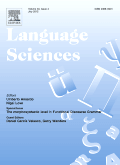
LANGUAGE SCIENCES
Fostering Insight into Language and SocietyLANGUAGE SCIENCES, published by Elsevier Science Ltd, stands as a prominent journal in the field of linguistics and language studies. With an impressive impact factor that solidifies its reputation, it holds a Q1 ranking in both the linguistics and language categories for 2023, reflecting its excellence and relevance in cutting-edge research. Since its inception in 1979, this journal has evolved to encompass a wide range of interdisciplinary studies, providing a platform for innovative research that addresses the complexities of language use, acquisition, cognition, and social interactions. The journal is hosted in the United Kingdom and features rigorous peer-reviewed articles that contribute significantly to both the academic community and practical applications in language-related fields. With access options tailored for a diverse range of readers and contributors, LANGUAGE SCIENCES invites scholars, students, and professionals to engage with its comprehensive body of work and contribute to the ongoing discourse in linguistics.
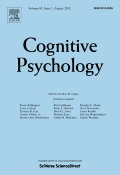
COGNITIVE PSYCHOLOGY
Unraveling the Mysteries of the MindCOGNITIVE PSYCHOLOGY is a premier academic journal published by Academic Press Inc. Elsevier Science, specializing in the dynamic and evolving field of cognitive psychology. With a significant history spanning from 1970 to 2024, this journal has established itself as a critical resource for researchers and professionals alike, boasting a distinguished ranking in the Q1 category across multiple disciplines, including Experimental and Cognitive Psychology, Neuropsychology, and Artificial Intelligence. Its impact factor, reflective of its influence and reputation within the academic community, positions COGNITIVE PSYCHOLOGY as an essential platform for disseminating cutting-edge research and theoretical advancements. Although it is not open access, subscribers gain exclusive insights into the latest findings that drive the field forward. The journal's commitment to fostering innovative research makes it an indispensable tool for those dedicated to understanding the complexities of human cognition.

RUSSIAN LINGUISTICS
Unlocking the complexities of Russian linguistics.RUSSIAN LINGUISTICS is a peer-reviewed academic journal published by Springer, dedicated to advancing the understanding of the Russian language and its interplay with various linguistic frameworks. With a longstanding history that spans from its inception in 1974, the journal encompasses a broad range of topics within the fields of linguistics and language studies, offering valuable insights especially in *Developmental and Educational Psychology* and the intricacies of linguistics at large. Currently ranked in the Q2 quartile for Linguistics and Language, and holding substantial positions within Scopus rankings, RUSSIAN LINGUISTICS serves as an essential resource for researchers, educators, and students alike, fostering dialogue and collaboration within the international linguistic community. The journal notably provides critical access to research findings that enhance the comprehension of Russian linguistics' role in a global context, despite operating under a traditional access model. For those pursuing scholarly excellence, RUSSIAN LINGUISTICS remains a pivotal platform for disseminating innovative research and promoting the study of language.

Journal of Cognitive Science
Pioneering Research in Cognitive ProcessesThe Journal of Cognitive Science, with ISSN 1598-2327, is a distinguished publication from SEOUL NATL UNIV, INST COGNITIVE SCIENCE, focusing on the multidisciplinary field of cognitive science. Established in 2016, this journal aims to advance knowledge in various domains, including Artificial Intelligence, Cognitive Neuroscience, and Experimental Psychology, while also delving into Linguistics and Language. Although currently categorized in Q4 for several subjects in the 2023 rankings, it presents an invaluable platform for innovative research and scholarly discourse, providing insights that connect cognitive processes with practical applications, thus fostering cross-disciplinary collaboration. Located in South Korea, the journal adheres to rigorous academic standards, inviting submissions that contribute significantly to understanding cognition in a digital age. While it does not offer Open Access, readers can access articles through university libraries and academic databases, engaging with the latest findings and theories that shape the future of cognitive science.
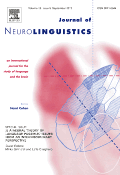
JOURNAL OF NEUROLINGUISTICS
Unraveling the Neural Threads of LinguisticsJOURNAL OF NEUROLINGUISTICS, published by Pergamon-Elsevier Science Ltd, is a premier academic journal that rigorously explores the intersection of language and the brain, emphasizing the cognitive and neurological underpinnings of linguistic processes. With an ISSN of 0911-6044 and an E-ISSN of 1873-8052, this journal has established itself as a crucial resource for researchers, professionals, and students in the fields of linguistics, cognitive neuroscience, and psychology. Boasting an impressive Q1 classification in Linguistics and Language and Arts and Humanities (miscellaneous) for 2023, the journal demonstrates significant impact, having achieved a ranking within the 91st percentile in Linguistics and Language according to Scopus rankings. The scope of the journal spans comprehensive studies from 1985 to 2025, reflecting a long-standing commitment to advancing the understanding of how language interacts with human cognition. Although it does not currently offer open access, its relevance extends well beyond its articles, contributing to ongoing scholarly dialogues and fostering new insights in the study of neurolinguistics.

Rivista di Psicolinguistica Applicata-Journal of Applied Psycholinguistics
Advancing Knowledge in Psycholinguistics.Rivista di Psicolinguistica Applicata - Journal of Applied Psycholinguistics is a distinguished journal dedicated to exploring the intersections of psychology and linguistics, making significant contributions across various subfields of psycholinguistics and its applications. Published by Fabrizio Serra Editore in Italy, this journal presents a repository of innovative research, theoretical advancements, and practical applications relevant to developmental and educational psychology, linguistics, and social psychology. Although currently listed in Q4 for Developmental and Educational Psychology and Q4 for Social Psychology, the journal has achieved a respectable Q3 ranking in Linguistics and Language, reflecting its commitment to enhancing understanding within these realms. With an E-ISSN of 1724-0646, the journal facilitates accessibility to its content, empowering scholars and practitioners to stay abreast of emerging trends and findings. The impact factor of the journal is poised for growth as it seeks to amplify its reach and influence within the academic community, appealing to researchers, professionals, and students who have a vested interest in the dynamic field of applied psycholinguistics.
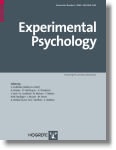
EXPERIMENTAL PSYCHOLOGY
Unveiling the complexities of the mind with rigorous research.EXPERIMENTAL PSYCHOLOGY is a premier journal dedicated to advancing the field of psychology through rigorous empirical research and innovative theoretical insights. Published by HOGREFE PUBLISHING CORP, this esteemed journal features an array of studies that delve into cognitive processes, experimental methodologies, and the intricate workings of human behavior. With a significant impact factor, EXPERIMENTAL PSYCHOLOGY holds a Q1 ranking in Arts and Humanities and maintains a commendable presence in the realms of Experimental and Cognitive Psychology. By providing Open Access options, the journal ensures that vital psychological research is widely accessible, fostering collaboration and knowledge sharing among researchers, practitioners, and students worldwide. Based in the United States, it has been a cornerstone of psychological literature since 1998, continuing to shape the discourse in its diverse and interdisciplinary scope. Researchers seeking to contribute to or stay informed about the latest advancements in psychological science will find EXPERIMENTAL PSYCHOLOGY an invaluable resource.

Journal of Cultural Cognitive Science
Advancing Insights in Language and MindThe Journal of Cultural Cognitive Science, published by SpringerNature, is an esteemed forum for researchers and scholars dedicated to exploring the intersection of culture, cognition, and language. With its ISSN 2520-100X and E-ISSN 2520-1018, this journal has made significant strides since its inception in 2017, covering a wide array of topics pertinent to Experimental and Cognitive Psychology and Linguistics and Language. Notably, it has achieved remarkable recognition, ranking in the Q3 category for Experimental and Cognitive Psychology and Q1 for Linguistics and Language in 2023. Its Scopus ranks further illustrate its impact, with the journal positioned at the 89th percentile in Social Sciences - Linguistics and Language and 47th percentile in Psychology. Despite its ongoing journey, it continues to foster open dialogue and innovation among professionals, researchers, and students, providing valuable insights and advancing knowledge in the field.